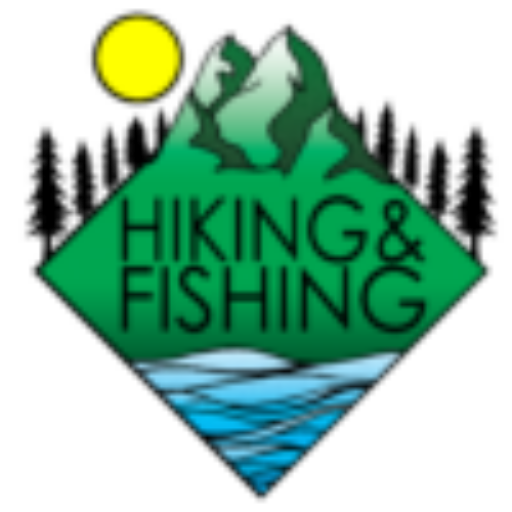If you’re looking for an outdoor adventure, Colorado is the place to be! With its Rocky Mountains and diverse landscape, there are plenty of hiking trails to choose from. In this blog post, we will highlight several of the best backpacking trails in Colorado. Whether you’re a beginner or experienced hiker, there’s something for everyone here! So pack your bags and get ready for some amazing views!
Important Note
In this article, we list common, and well known, backpacking trails. This is by no means a complete list. We have left out hundreds, if not thousands of options in Colorado for backpacking. Nearly every trailhead, or every mountain can be turned into a fantastic adventure. Some of the best backpacking trips can come from non traditional backpacking loops by studying maps of beautiful locations, so don’t let this list limit you!
Frequently Asked Questions
Before we dive into our top backpacking trails, we wanted to highlight some common questions.
Is Colorado A Great Backpacking Destination?
Absolutely! Colorado has some of the best backpacking trails in the country. With its diverse landscape and beautiful scenery, it’s no wonder why so many people flock here each year.
Here are a few key reasons:
- Colorado has some of the highest peaks in the U.S. and is home to more fourteen thousand foot peaks than anywhere else in the U.S. (debatably 58 of them, and a whole lot more 13ers and 12ers as well)
- Colorado has incredible wildlife populations. Elk, Moose, Deer, Marmots, Pika, over 500 species of birds, and a lot more.
- Colorado has incredible diversity in different seasons. Wildflowers in spring, incredible winter scenery, and wild differences in weather based on your elevation.
- There is A LOT of public land for hiking and backpacking. Over 43% of Colorado is public land, which is the 10th highest percentage for states in the U.S.
Is It Safe to Hike in Colorado?
For the most part, yes, but Colorado is a state where extra preparation and experience is highly recommended. Colorado has rapidly changing weather, storms at high elevation can prove deadly, and do for backpackers every year. That means proper planning and gear is absolutely essential, especially if your trip takes you above treeline. Colorado is also home to mountain goats, elk, moose, bear, mountain lions, and other animals that mean recreationalists need to take wildlife precautions as well.
Colorado is also a very avalanche prone part of the country. People die every year in Colorado backcountry skiing and snowshoeing. Extra experience and precaution is needed in winter.
High altitude can also hit hard for some, so knowing the symptoms of altitude sickness such as nausea, headaches, loss of appetite, and dizziness is important.
Is a Permit Required for Backpacking Hikers In Colorado?
Most hiking trails in Colorado are free to access. However, you will need a permit to access some specific locations. This is especially so for national parks and unique wilderness places like the Indian Peaks Wilderness.
If you are taking a weekend-long backpacking trip, you must be informed of the designated camping sites and be sure to practice Leave No Trace (LNT) camping ethics.
When is the Best Time to Go on a Backpacking Trip in Colorado?
Despite the numerous hiking trails, some are not accessible all year round, so it would be wise to understand the best time to start your backpacking trip, especially if hiking is one of your main goals.
For instance, if you plan to hike in the mountains, especially those with higher elevation, many roads to trailheads are closed until mid June, and snow exists on many trails into late June and July.
For this reason, along with temperatures, Late June – September tend to be the most common times for backpacking trips in Colorado. It is worth noting that summer months bring the risk of rapidly changing weather with rain and lightning very frequently on high elevation peaks.
What Should You Pack for Your Backpacking Trip?
Remember your gear will help you load on your trip during hiking as well as camping, so ensure you have all the essentials. Read our complete backpacking checklist guide, but if you can, be sure to include some non-necessary gear for comfort:
- Camping Crocs or sandals are easy to remove and wear as you get in and out of your tent.
- Pillow / Extra cushioning
- Tent entertainment – game, cards, etc
- Dessert of some kind – chocolate, fruit, candy, etc
- A backpacking chair, foam pad, hammock, or other comfortable item for outside the tent
Best Backpacking Trails in Colorado
Below is a list of the top hiking trails catering to people of all levels, from beginners and intermediate to advanced backpackers.
Crater Lake, Indian Peaks Wilderness
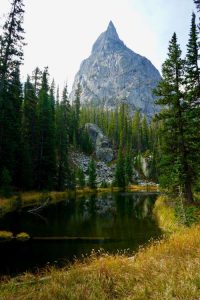 There are a lot of crater lakes in the country and in Colorado. This one sits below Lone Eagle Peak in The Indian Peaks Wilderness, giving it some of the most incredible views you’ll ever see. The hike is a relatively simple out and back trail the features stunning lakes, great fishing, gorgeous forests, and then backpackers are rewarded with the unique Lone Eagle peak looming over several lakes. You’ll often find climbers heading up it too.
There are a lot of crater lakes in the country and in Colorado. This one sits below Lone Eagle Peak in The Indian Peaks Wilderness, giving it some of the most incredible views you’ll ever see. The hike is a relatively simple out and back trail the features stunning lakes, great fishing, gorgeous forests, and then backpackers are rewarded with the unique Lone Eagle peak looming over several lakes. You’ll often find climbers heading up it too.
Click here for a map of this route.
Quick Facts:
Miles: 14.6 miles round trip
Elevation Gain: 3,033 feet round trip
Dogs: Allowed on leash
Duration: 2 days
Trailhead Location: Monarch Lake Trailhead
Read More About Hiking To Lone Eagle Peak Here.
Lost Creek Wilderness Loop
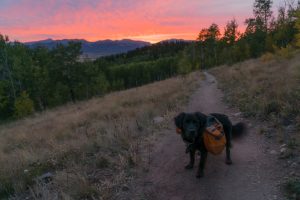 Lost Creek Loop offers backpackers stunning views of Colorado, in an area where there are far fewer backpackers than other sections of Colorado. This trail is known for unique rock formations Hikers can spend the night on one of the many campsites on the trail as they are frequent and first come first serve.
Lost Creek Loop offers backpackers stunning views of Colorado, in an area where there are far fewer backpackers than other sections of Colorado. This trail is known for unique rock formations Hikers can spend the night on one of the many campsites on the trail as they are frequent and first come first serve.
A great bonus to this loop is that you can start from various trailheads, you can shorten it or increase it based on how far you want to go, and overall, this is just a different style scenery when compared to other Colorado backpacking loops.
Quick Facts:
Miles: 28-37 mile loop (a shorter loop option exists)
Elevation Gain: 6,300 (for longer loop)
Dogs: Allowed on leash
Duration: Between 2-4 days
Trailhead Location: Goose Creek Trailhead (however hikers can take a look at a map and choose a different trailhead along the loop)
Read More About The Lost Creek Wilderness Loop Here.
Chicago Basin
 The Chicago Basin is one of the most sought after backpacking trips in Colorado. Many backpackers choose to take the train from Durango to the Needleton stop (30 miles north of Durango). This train is a stunningly beautiful ride, and takes a round trip hike into Chicago Basin from 32 miles down to 15.2 miles round trip.
The Chicago Basin is one of the most sought after backpacking trips in Colorado. Many backpackers choose to take the train from Durango to the Needleton stop (30 miles north of Durango). This train is a stunningly beautiful ride, and takes a round trip hike into Chicago Basin from 32 miles down to 15.2 miles round trip.
The entire trail is stunning. It takes hikers along rivers waterfalls, fish, and then eventually takes hikers into Chicago Basin where the surrounding peaks are incredible.
Hikers have the option of summiting multiple Colorado 14ers, or starting from the Purgatory Creek Trailhead to add additional miles, vertical gain, and scenery.
Skipping the train and starting from the Purgatory Creek Trail makes this a 32.4 mile backpacking trip with 8,300 feet of elevation gain round trip.
Quick Facts:
Miles: 15.2 miles round trip (many more miles possible)
Elevation Gain: 4,903
Dogs: Allowed
Duration: Between 2-4 days
Trailhead Location: Durango Silverton Railroad or Purgatory Creek Trailhead
Read More About The Chicago Basin Here.
Blue Lakes Trail – Telluride
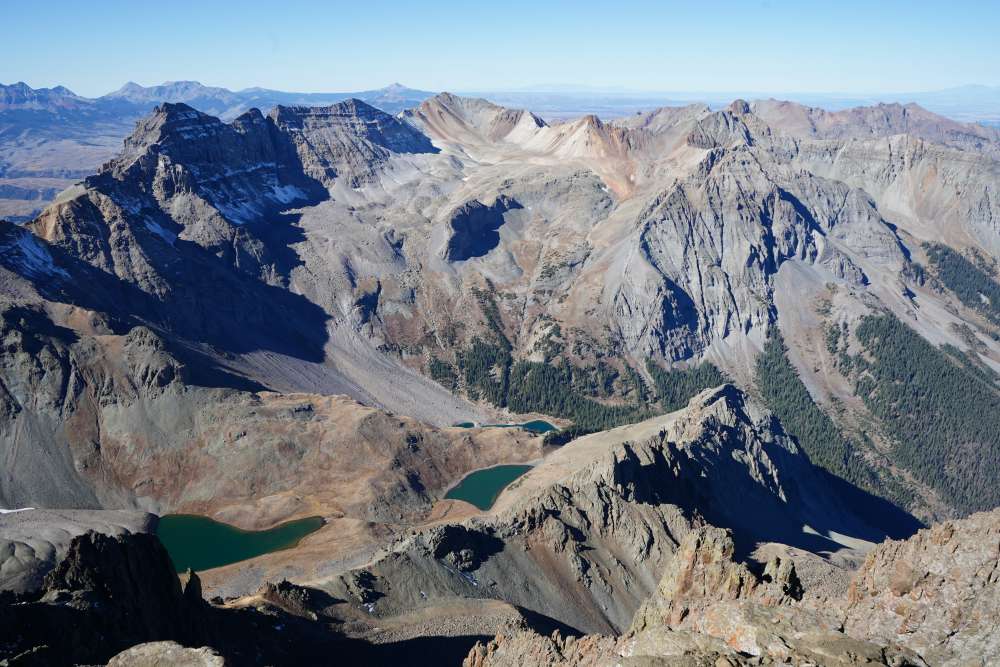 This is ideal for beginners as it is an 8.6-mile-long hike (round trip), that features gradual gains It’s perfect for the weekend as you spend the night in the wilderness. That should give you ample opportunity to enjoy the beautiful landscape and enjoy stargazing.
This is ideal for beginners as it is an 8.6-mile-long hike (round trip), that features gradual gains It’s perfect for the weekend as you spend the night in the wilderness. That should give you ample opportunity to enjoy the beautiful landscape and enjoy stargazing.
Blue Lakes Trail is located outside Telluride, and it offers backpackers stunning views as they hike through the San Juan Wilderness.
3.5 miles into your hike, you’ll get stunning views of the first lake. It is also an excellent camping spot. So if you have a day to spare, you can rest here and resume your hike the following day.
Half a mile from your first lake and camping site, you’ll get to see the second lake. And then a quarter-mile later, the last lake should bring you in touch with breathtaking alpine views, flowers surrounding it, and vast greenery.
Hikers can continue past the last lake up to a stunning pass where many will turn around, and others may continue into the next basin, or up Mount Sneffels.
Quick Facts:
Miles: 8.4 miles round trip
Elevation Gain: 2,880 feet
Dogs: Allowed on leash
Duration: 2 days
Trailhead Location: Blue Lakes Trailhead – Telluride
Read More About The Blue Lakes Basin Here.
Snowmass Lake
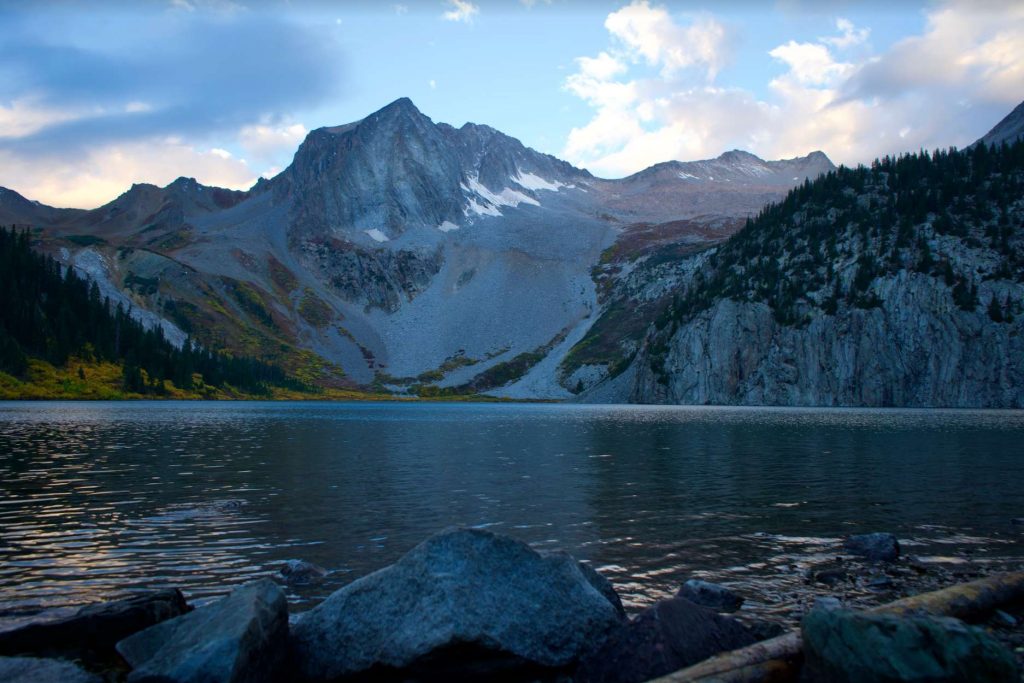
Snowmass Lake might just be one of the most picturesque lakes on the planet. Located in Snowmass Colorado, an incredibly popular ski destination, it also sits at the base of the Colorado 14er, snowmass mountain.
This hike is a bit strenuous up to the lake, but it is well worth the challenge. There are many backcountry sites near the lake, and hikers have the option to summit nearby ridges or peaks for even more fantastic views.
This is also a portion of the Four Pass Loop, another backpacking trip on this list. This hike is a bit shorter given this is just to the lake and back.
View our map of the Snowmass Lake route.
Quick Facts:
Miles: 16.6 miles round trip (26.07 km)
Elevation Gain: 10,980 feet (3346.7 m)
Dogs: Allowed on leash
Duration: 2 days (or longer)
Trailhead Location: Maroon Snowmass Trailhead
Read More About Snowmass Lake Here.
Gore Lake and Deluge Lake
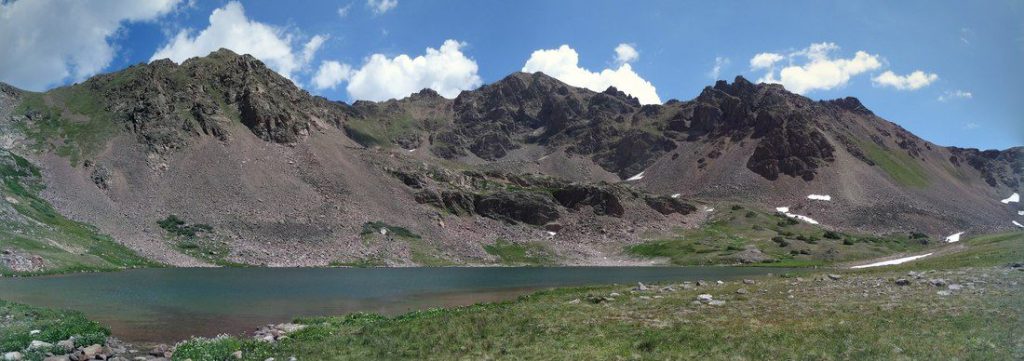
Deluge Lake, Colorado
Suppose you want to enjoy the night by the lake, watching the tranquil water that melts away your negative thoughts. Or you want to enjoy a romantic night as you lay down with your partner watching the stars. Or maybe you love to both backpack and fish (like us).
In that case, plan for a weekend-long backpacking trip to Gore Lake and Deluge Lake.
The hiking trail here is 14 miles long, and you don’t have to hurry. You can take your time and enjoy the wildflowers and picturesque views of the wilderness.
Note that the two lakes are not far from each other. However, this trail is at high elevation, and does have some solid elevation gain, making the short miles still difficult. In addition to this, the route between the two lakes is not an established trail, meaning this is a trip that only intermediate to experienced backpackers should attempt.
Proper bear precaution should definitely be taken on this loop. You will also see other animals such as elk, mountain goats, and beautiful birds. You can bring your dog along, but ensure it’s on a leash.
In addition to scatter great camping locations, there is a cabin that is first come first serve on the south side of Deluge Lake.
Recommended itinerary:
- Day 1 – Head to Gore Lake and camp (5.8 miles / 9.3 km)
- Day 2 – Head to Deluge Lake and camp (3.6 miles / 5.7 km)
- Day 3 – Walk out the Gore Creek trailhead (4.6 miles / 7.4 km)
Quick Facts:
Miles: 14 miles (22.4 km) round trip
Elevation Gain: 5,565 feet
Dogs: Allowed on leash
Duration: 3 days, 2 nights
Trailhead Location: Gore Creek Trailhead
Read More About This Loop Here.
Four Pass Loop / Maroon Bells
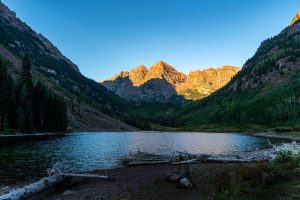
Maroon Bells as seen from Maroon Lake
This is one of the most hiked backpacking trails in Colorado as it offers awe-inspiring views of the wildflowers, vast meadows, alpine lakes, rugged peaks, and green forests. The course also takes you around the stunning Maroon Bells while giving fantastic views of the Elk Range.
This trail covers about 26.8 miles, which will take three to four days. This can be challenging for beginners, and thus suitable for intermediate hikers.
Quick Facts:
Miles: 28 miles (45.06 km) round trip
Elevation Gain: 7,753 feet
Dogs: Allowed on leash
Duration: 3 days, 2 nights
Trailhead Location: Maroon Snowmass Trailhead
Read More About The Four Pass Loop Here.
Sand Ramp Trail
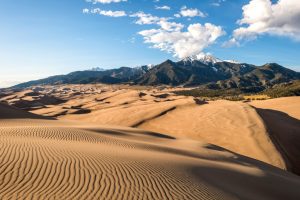 The Sand Ramp Trail is located in the Great Sand Dunes National Park, and it’s popular among backpackers as it offers numerous backcountry campsites. The trail goes beside the sand dunes, which allows backpackers to select backcountry sites and take side trips onto the actual sand dunes for more unique views.
The Sand Ramp Trail is located in the Great Sand Dunes National Park, and it’s popular among backpackers as it offers numerous backcountry campsites. The trail goes beside the sand dunes, which allows backpackers to select backcountry sites and take side trips onto the actual sand dunes for more unique views.
Since it’s in a national park, you will need to purchase a permit. But it’ll be worth it as this trail allows seeing the tallest dune in North America.
You may imagine this place to be quite dry as it can often appear like a desert. Luckily, there is a creek that runs alongside the dunes, making it easy to refill and filter water.
Where you are used to traversing through greenery and meadows filled with wildflowers, dunes offer great contrast. This has made our list as it is one of the most unique places to backpack in Colorado as it is vastly different from any other terrain, yet stunning.
Quick Facts:
Miles: Up to 24 miles
Elevation Gain: Up to 3,300 feet
Permits: National Park Pass required, and backcountry camping permits required.
Dogs: Allowed only in parts of the park, not on the Sand Ramp trail
Duration: 2 days, 1 night
Trailhead Location: Great Sand Dunes National Park Parking
Read More About The Sand Ramp Here.
Continental Divide Loop
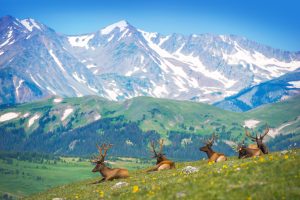 This is another one of Colorado’s most popular backpacking trails as it features some of the best scenery in Rocky Mountain National Park. The trail includes alpine lakes, waterfalls, wildflowers, and diverse wildlife. The loop is about 30 miles long, and takes three to four days to complete. This is a difficult hike, and is only recommended for experienced backpackers.
This is another one of Colorado’s most popular backpacking trails as it features some of the best scenery in Rocky Mountain National Park. The trail includes alpine lakes, waterfalls, wildflowers, and diverse wildlife. The loop is about 30 miles long, and takes three to four days to complete. This is a difficult hike, and is only recommended for experienced backpackers.
This loop takes you around some of the best views in Rocky Mountain National Park. This is a high elevation loop, and leaves backpackers with tons of options to extend the trip, or adjust it towards their preferences as the park has so many great trail options and peaks to summit.
Quick Facts:
Miles: 28 miles
Elevation Gain: 5,266 feet
Permits: National Park Pass required, and backcountry camping permits required. Bear canisters are required.
Dogs: Not allowed
Duration: 3 days, 2 nights
Trailhead Location: Green Mountain Trailhead – Thought Hikers can enter the loop from various areas in Rocky Mountain National Park
Read More About The Continental Divide Loop Here.
How To Plan Your Trip
We have written some really great resources to help you plan your next backpacking trip:
Beginner’s Guide to Backpacking
How To Plan/Route Your Backpacking Trip
Preparing For Your First Backpacking Trip (Gear)
How To Train For Backpacking / Thru-Hike
Final Thoughts
If you love hiking and backpacking and live in Colorado, you are living a backpacker’s dream. This Centennial State has many hiking trails that fit beginners, intermediate, and advanced backpackers, irrespective of where you live.
If you’d like to go on a backpacking trip to Colorado with hiking as one of your main goals, take some inspiration from this list of the best backpacking trails in Colorado and plan your next adventure. Keep in mind that we haven’t even touched on 1% of Colorado’s great backpacking in this list, so be sure to do your own research, ask around, and find some other incredible options once you’ve checked out this list thoroughly.
Max DesMarais is the founder of hikingandfishing.com. He has a passion for the outdoors and making outdoor education and adventure more accessible. Max is a published author for various outdoor adventure, travel, and marketing websites. He is an experienced hiker, backpacker, fly fisherman, backcountry skier, trail runner, and spends his free time in the outdoors. These adventures allow him to test gear, learn new skills, and experience new places so that he can educate others. Max grew up hiking all around New Hampshire and New England. He became obsessed with the New Hampshire mountains, and the NH 48, where he guided hikes and trail runs in the White Mountains. Since moving out west, Max has continued climbed all of the Colorado 14ers, is always testing gear, learning skills, gaining experience, and building his endurance for outdoor sports. You can read more about his experience here: hikingandfishing/about
